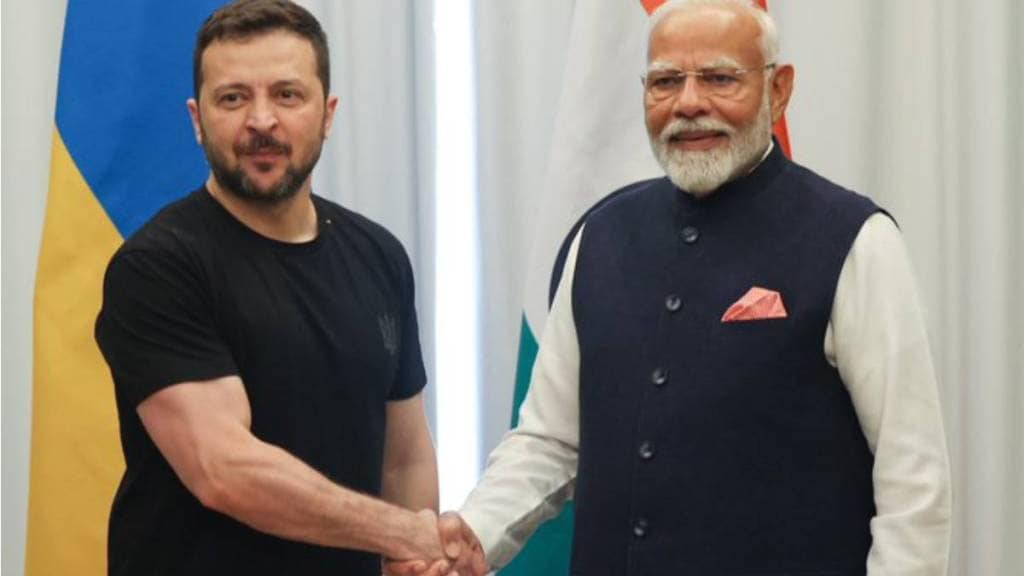In the wake of Prime Minister Narendra Modi’s recent meeting with Ukrainian President Volodymyr Zelensky, India has decided to send Secretary (West) Ambassador Pawan Kapoor to represent the country at the two-day peace summit in Switzerland, held on June 15-16. The summit, titled ‘Summit on Peace in Ukraine,’ has attracted heads of state and representatives from approximately 100 countries, including Zelensky himself.
Switzerland initiated the organization of the ‘Summit on Peace in Ukraine.’ However, Russia declined to participate due to a lack of prior consultation. In solidarity with Russia, China also opted out of the summit. While US President Joe Biden is attending the G-7 Summit in Italy from June 13-15, he will not be present in Switzerland. Instead, US Vice President Kamala Harris is attending the Ukraine Peace Summit on his behalf. The heads of state from all other G-7 member countries are participating in the summit.
India’s close ties with Russia influenced Prime Minister Modi’s decision not to attend the Peace Summit. Neither External Affairs Minister S Jaishankar nor Foreign Secretary Vinay Kwatra were sent to Switzerland, even though they accompanied PM Modi to the G-7 Summit in Italy. Upon their return to India on Friday evening, Modi informed Zelensky of India’s delegation to the Peace Summit during their meeting. Modi urged Zelensky to focus on ‘dialogue and diplomacy’ to resolve hostilities with Russia.
Why Ambassador Pawan Kapoor?
India has chosen to send Ambassador Pawan Kapoor, the most senior career diplomat after Vinay Kwatra, to Switzerland. Kapoor currently serves as Secretary (West) in the Ministry of External Affairs. After spending nearly two and a half years in Moscow as the Indian Ambassador to Russia, Kapoor returned to South Block in April 2024. His tenure in Moscow coincided with the Russian invasion of Ukraine in February 2022.
During this period, Kapoor closely observed the Russia-Ukraine war and maintained India’s diplomatic presence in Moscow. He played a significant role in ensuring the continuity of military equipment supplies, joint weapon manufacturing, and oil imports from Russia. Before his posting in Russia, Kapoor also served as the Indian Ambassador to Israel and the UAE.
Russian President Vladimir Putin, addressing his Foreign Ministry officials on Friday, reiterated that resolving the Ukraine conflict is ‘impossible’ without Russia’s participation in the summit. Putin stipulated two major conditions for a ceasefire: Ukraine must withdraw its troops from areas occupied by Russia in the past two years (Donetsk, Luhansk, Zaporizhia, and Kherson) and abandon its pursuit of NATO membership.
Ukraine Rejects Putin’s Conditions
Ukraine, however, has firmly rejected both of Putin’s conditions. Ukrainian Foreign Minister Dmytro Kuleba dismissed Putin’s proposal as an ‘ultimatum’ and refused to accept the terms. Zelensky has also consistently stated that Ukraine will not negotiate with Russia until Russian forces vacate all occupied territories.
Upon his arrival in Switzerland, Zelensky emphasized the summit’s importance in addressing global concerns. He stated that the Peace Summit “will provide the global majority with an opportunity to take specific steps in areas that are important to everyone in the world: nuclear security, food security, and the return of all deported persons, including prisoners of war and deported Ukrainian children.”
While the G-7 member countries gather in Switzerland to discuss peace in Ukraine, Putin’s dissatisfaction with the G-7 remains apparent. He is particularly incensed by the G-7’s decision to loan US$50 billion to Ukraine using the income from Russia’s frozen bank accounts and assets. Putin has warned that Western countries ‘will not be spared’ for appropriating Russia’s assets.
India’s involvement in the summit through Ambassador Kapoor signifies its diplomatic balancing act amid the ongoing Russia-Ukraine conflict. As global leaders convene to seek peaceful resolutions, the absence of key players like Russia and China highlights the complexities and challenges of achieving lasting peace in the region.


